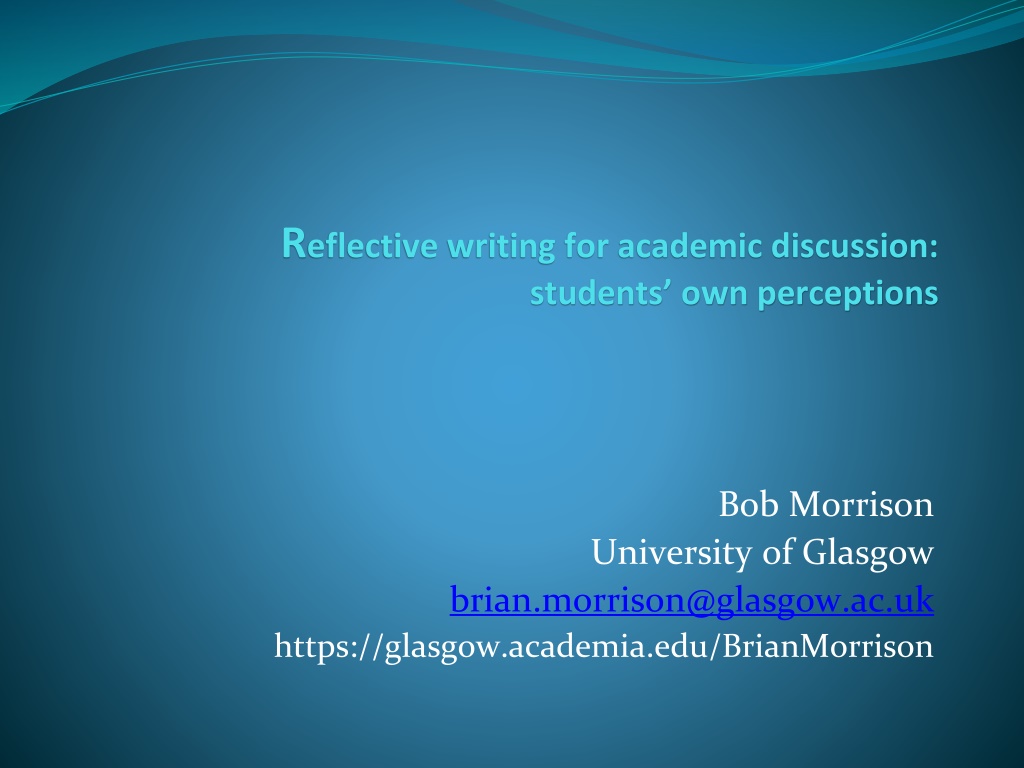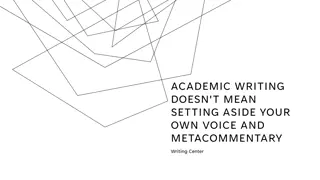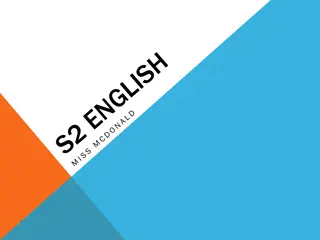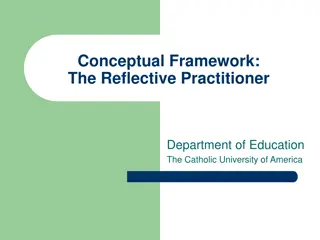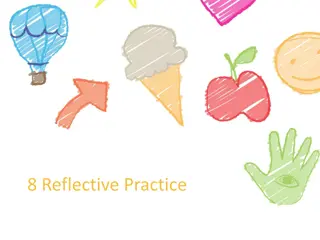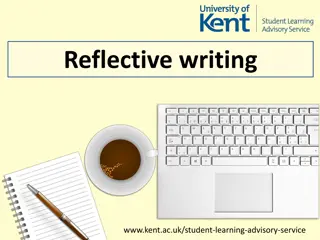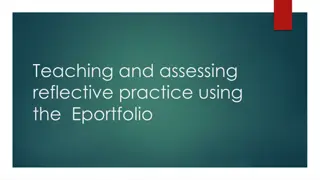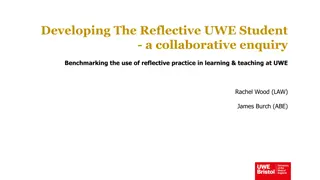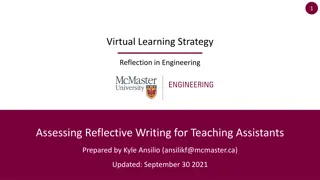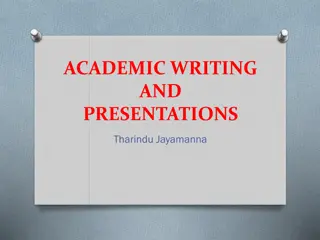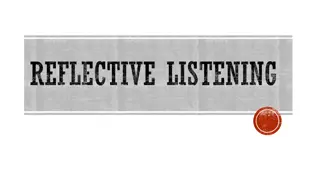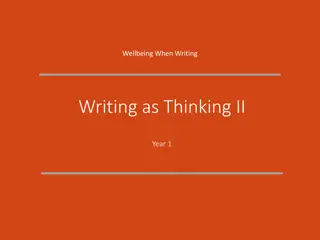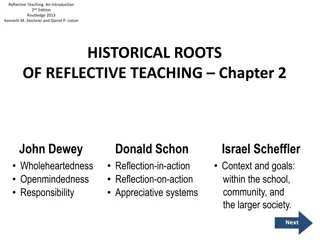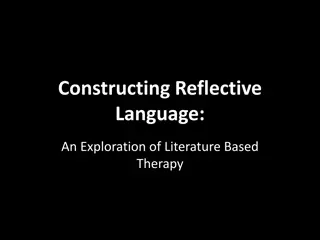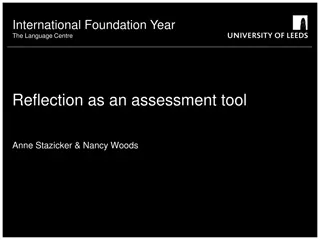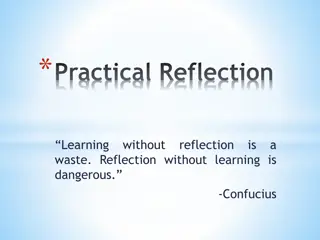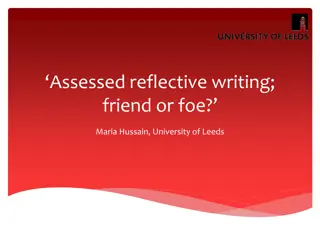Enhancing Academic Discussion Through Reflective Writing
Explore the process of reflective writing for academic discussions, focusing on students' perceptions and guided reflections. The course structure, purpose, and key aspects of reflective writing are discussed, offering insights on improving academic discussion skills. Dive into meaning-making processes and thoughtful consideration for future actions in academia.
Download Presentation

Please find below an Image/Link to download the presentation.
The content on the website is provided AS IS for your information and personal use only. It may not be sold, licensed, or shared on other websites without obtaining consent from the author.If you encounter any issues during the download, it is possible that the publisher has removed the file from their server.
You are allowed to download the files provided on this website for personal or commercial use, subject to the condition that they are used lawfully. All files are the property of their respective owners.
The content on the website is provided AS IS for your information and personal use only. It may not be sold, licensed, or shared on other websites without obtaining consent from the author.
E N D
Presentation Transcript
Reflective writing for academic discussion: students own perceptions Bob Morrison University of Glasgow brian.morrison@glasgow.ac.uk https://glasgow.academia.edu/BrianMorrison
Overview Course Purpose Structure Reflective writing guided reflections Students evaluation of Reflective writing Progress Any questions
Course structure 2 x 5-weeks In-class (2 x 50 mins/week) + out-of-class (8 hours) 10 credits = 100 hours Reflection Reflection Input Input Output Output Preparation Preparation Thur Mon Thur Mon
Course structure 2 x 5-weeks In-class (2 x 50mins/week) + out-of-class (8 hours) 10 credits = 100 hours Written reflection Written reflection Academic discussion skills Functional language Academic discussion skills Functional language Discussion around (an) academic text(s) Discussion around (an) academic text(s) Select & read an academic text Select & read an academic text Thur Mon Thur Mon
Reflective writing Dadds (1993) Brookfield (1995) Convery (1998)
Reflective writing a meaning making process that involves participation in a systematic inquiry that contributes to the interpretation of experience in order to learn from the experience (Smith, 2008:76) praxis stance a habit of mind that would ensure careful consideration about how [one] would act more wisely when faced with similar circumstances in the future (Smith, 2008:81)
Reflective writing Student-student & student-teacher Shines light Guided What was done well What could have been improved How can this improvement be developed in the future?
Students evaluation Before this course, what was your experience of reflective writing? (n=42) For undisclosed reason 14% For presessional 10% For work 5% None 71%
Students evaluation Before this course, did you think this reflective writing would help your speaking? Please explain. (n=47) I do not believe writing could help my academic speaking because I feel oral and written are totally two kinds. But actually writing is beneficial to clearing thoughts. Maybe 5% No 43% Yes 52% First I was sceptical about that method but after doing it I changed my point of view and think it is quite helpful.
Students evaluation Now you are halfway through this course, do you think reflective writing has helped your speaking? Please explain. (n=47) A little. It depends on how much effort you make after the class Yes, it pushed me to improve myself and I will try to do better next time. No 2% It depends 15% Yes 83% Not much. Speak well just need practice and talk. Yes, knowing the strength and weakness can help me to get the study direction.
Students evaluation (progress) 60% (N = 74) 50% 40% This course has not helped my progress. 30% I have made slow progress. I have made OK progress. I have made good progress. 20% 10% 0% to be more confident to choose academic texts to understand academic texts to analyse academic texts to talk about academic texts to interact with others in an academic environment
Students evaluation (progress) (N = 74) 60% 50% 40% This course has not helped my progress. 30% I have made slow progress. I have made OK progress. I have made good progress. 20% 10% 0% to understand your strengths to understand your weaknesses to plan to improve to reflect
Thank you for listening Any questions? Brian R. Morrison Bob Morrison University of Glasgow brian.morrison@glasgow.ac.uk https://glasgow.academia.edu/BrianMorrison
References Brookfield, S. D. (1995) Becoming a critically reflective teacher, San Francisco, Jossey-Bass. Convery, A. (1998) A teacher's response to reflection in action , in Cambridge Journal of Education, vol. 28, no. 2, pp. 197-205. Dadds, M. (1993) The feeling of thinking in professional self study , in Educational Action Research, vol. 1, no. 2, pp. 287-303. Dewey, J. (2008) How we think: a restatement of the relation of reflective thinking to the educative process , in J. A. Boydston (ed.), The later works, 1925 - 1953 - John Dewey - volume 8: 1933 - essays and how we think, revised edition, Carbondale, Southern Illinois University Press, pp. 105-352. Husu, J., Toom, A. and Patrikainen, S. (2008) Guided reflection as a means to demonstrate and develop student teachers reflective competencies , in Reflective Practice, vol. 9, no. 1, pp. 37-51. Sch n, D. A. (1983) The reflective practitioner, United States, Basic Books. Smith, T. J. (2008) Fostering a praxis stance in pre-service teacher education , in S. Kemmis and T. J. Smith (eds.), Enabling praxis: challenges for education, Rotterdam, Sense Publishers, pp.65-84.
Course integration AEfBS Leadership workshop enlightened Alumni workshop Ceilidh engaged Business Simulation Workshop Selling yourself workshop enterprising
